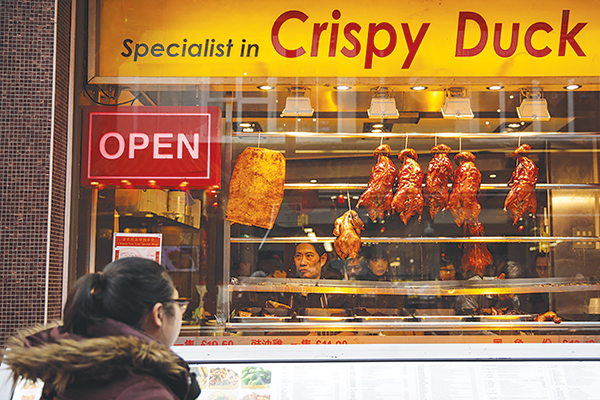Chinese cuisine evolves into vibrant tapestry
London expands its Far East offerings, from Cantonese dim sum and Sichuan hotpot to Lanzhou lamian and Taiwanese bubble tea, Wang Mingjie reports.


Burning hot
London's dining scene now showcases specialties from across China. Restaurants like Barshu and Jincheng Alley bring the numbing heat of Sichuan peppercorns and complex chili sauces to eager diners.
Luan Zhixin, owner of Jincheng Alley, explains her motivation.
"During the pandemic, many of us abroad longed for authentic flavors from home. We wanted to create a space where Chinese expats could enjoy genuine Sichuan cuisine and introduce locals to authentic Chinese flavors."
At Jincheng Alley, authenticity is key, she says.
"Our chilies, Sichuan peppercorns, and other seasonings are sourced directly from Sichuan," Luan emphasizes. "This ensures a flavor profile that differs from locally available ingredients. Customers also appreciate the consistency in quality and the decor, which reflects the warmth and simplicity of small eateries in China."
Luan has witnessed firsthand how London's Chinese dining scene has evolved.
"The market has seen the entry of major Chinese dining brands offering hotpot, bubble tea, and spicy soup, creating more competition. When we opened in 2021, we relied on word-of-mouth recommendations, but now we focus on increasing visibility to stand out in this crowded space."
While some restaurants adapt to local tastes, Luan believes in maintaining authentic Sichuan flavors.
"Our chefs carefully select ingredients and seasonings to preserve the true essence of Sichuan cuisine. Competition from fusion restaurants motivates us to stay true to our mission: providing Chinese expats with a taste of home and showcasing the depth of Chinese culinary culture to locals."
Meanwhile, the flavors of Shaanxi and Xinjiang are also making waves. Restaurants like Master Wei serve hearty hand-pulled noodles, while Xinjiang cuisine delights with cumin-spiced lamb skewers. These dishes offer diners new flavors and deeper cultural experiences.
Diversified market
Kevin Tang, chairman of the Chinese Catering Association of UK, praises the growing diversity of Chinese cuisine in London.
"This variety reflects broader acceptance of Chinese culinary culture and attracts more international customers," he says, noting the presence of 11 Michelin-starred Chinese restaurants in the city that mostly lean toward fusion flavors that meet local expectations.
Tang explains the challenges Chinese dining culture faces when evaluated by Michelin standards, which focus on individual dining experiences rather than the lively communal style that is traditional to Chinese meals.
"To succeed, restaurants must adapt to the system," he says.
As the market diversifies, Tang sees a growing trend toward smaller, more refined dining formats that allow Chinese cuisine to adapt to global markets. His own restaurant, Bright Courtyard Club, combines Cantonese and Shanghai flavors while focusing on quality and innovation.
"We continuously refine our menu by introducing new dishes and enhancing existing ones," Tang explains. "Additionally, we leverage social media to sustain visibility and actively participate in public events to boost our exposure and reputation."
Cheung from Durham University also emphasizes the importance of advancing the industry through education, suggesting that London's Chinese culinary landscape could benefit from the establishment of serious, larger culinary schools dedicated to teaching authentic Chinese cooking, which would inspire greater appreciation and mastery of the cuisine.
Cheung also underscores the need for improved shopping experiences at Chinese supermarkets.
"While these supermarkets are popular, modernization and a more welcoming atmosphere are needed," he says. He proposes the introduction of premium Chinese supermarket chains, such as Pangdonglai, to elevate the shopping experience for Londoners and residents of other major UK cities.
The evolving Chinese food scene in London represents more than just culinary innovation — it reflects a broader cultural shift, offering diners deeper insights into China's rich culinary traditions and fostering opportunities for cultural exchange. With its diverse and dynamic offerings, London is becoming a true global hub for Chinese cuisine.



































